Image by: Aldo Leopold Foundation
“That land is a community is the basic concept of ecology, but that land is to be loved and respected is an extension of ethics.” – Aldo Leopold
Aldo Leopold (1887-1948) is considered the father of wildlife ecology and a true Wisconsin hero. He was a renowned scientist and scholar, exceptional teacher, philosopher, and gifted writer. It is for his book, A Sand County Almanac, that Leopold is best known by millions of people around the globe. The Almanac, often acclaimed as the century's literary landmark in conservation, melds exceptional poetic prose with keen observations of the natural world. The Almanac reflects an evolution of a lifetime of love, observation, and thought. It led to a philosophy that has guided many to discovering what it means to live in harmony with the land and with one another.

The roots of Leopold's concept of a "land ethic" can be traced to his birthplace on the bluffs of the Mississippi River near Burlington, Iowa. As a youngster, he developed a zealous appreciation and interest in the natural world, spending countless hours on adventures in the woods, prairies, and river backwaters of a then relatively wild Iowa. This early attachment to the natural world, coupled with an uncommon skill for both observation and writing, lead him to pursue a degree in forestry at Yale.
After Yale, Leopold joined the U.S. Forest Service and was assigned to the Arizona Territories. During his tenure, he began to see the land as a living organism and develop the concept of community. This concept became the foundation upon which he became conservation's most influential advocate. In 1924, he accepted a transfer to the U.S. Forest Products Laboratory in Madison where he served as associate director, and began teaching at the University of Wisconsin in 1928.
Often credited as the founding father of wildlife ecology, Leopold's cornerstone book Game Management (1933) defined the fundamental skills and techniques for managing and restoring wildlife populations. This landmark work created a new science that intertwined forestry, agriculture, biology, zoology, ecology, education and communication. Soon after its publication, the University of Wisconsin created a new department, the Department of Game Management, and appointed Leopold as its first chair.
Leopold's unique gift for communicating scientific concepts was only equal to his fervor for putting theories into practice. In 1935, the Leopold family purchased a worn-out farm near Baraboo, in an area known as the sand counties. It is here Leopold put into action his beliefs that the same tools people used to disrupt the landscape could also be used to rebuild it. An old chicken coop, fondly known as the Shack, served as a haven and land laboratory for the Leopold family, friends, and graduate students. And it was here Leopold visualized many of the essays of what was to become his most influential work, A Sand County Almanac.
(http://www.naturenet.com/alnc/aldo.html)

Aldo Leopold was born in Burlington, Iowa, on January 11, 1887. As a boy he developed a lively interest in field ornithology and natural history, and after schooling in Burlington, at Lawrenceville Prep in New Jersey, and the Sheffield Scientific School at Yale, he enrolled in the Yale forestry school, the first graduate school of forestry in the United States. Graduating with a masters in 1909, he joined the U.S. Forest Service, by 1912 was supervisor of the million-acre Carson National Forest, and in 1924 accepted the position of Associate Director of the U.S. Forest Products Laboratory in Madison, Wisconsin, the principal research institution of the Forest Service at that time. In 1933 he was appointed to the newly created chair in Game Management at the University of Wisconsin, a position he held until his death.
Leopold was throughout his life at the forefront of the conservation movement—indeed, he is widely acknowledged as the father of wildlife conservation in America. Though perhaps best known for A Sand County Almanac, he was also an internationally respected scientist, authored the classic text Game Management, which is still in use today, wrote over 350 articles, most on scientific and policy matters, and was an advisor on conservation to the United Nations. He died of a heart attack on April 21, 1948 while helping his neighbors fight a grass fire. He has subsequently been named to the National Wildlife Federation's Conservation Hall of Fame, and in 1978, the John Burroughs Memorial Association awarded him the John Burroughs Medal for his lifework and, in particular, for A Sand County Almanac.
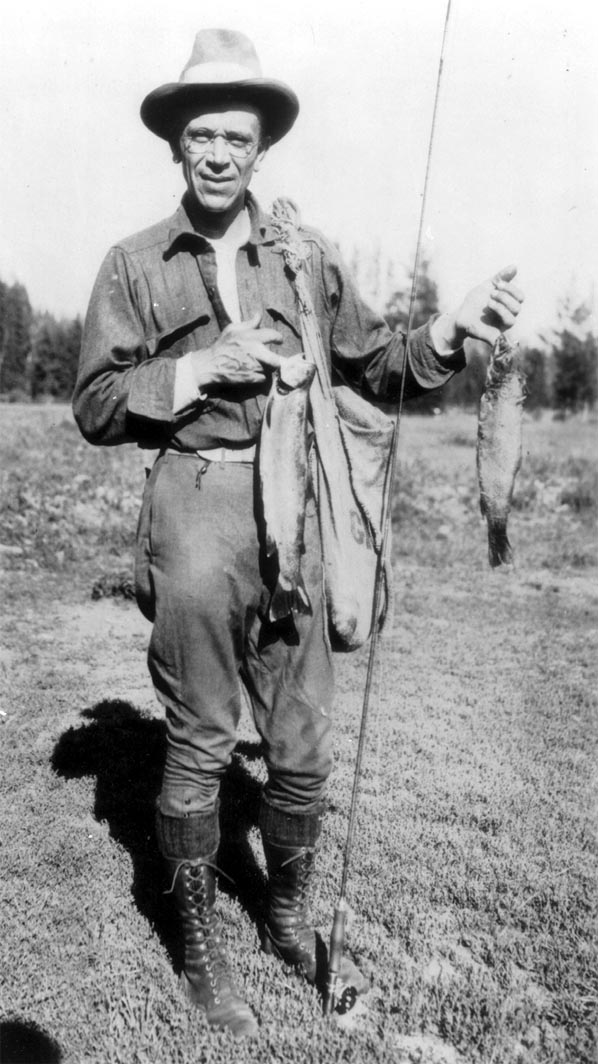 |
Aldo Leopold, creator of
the "land ethic" concept. |
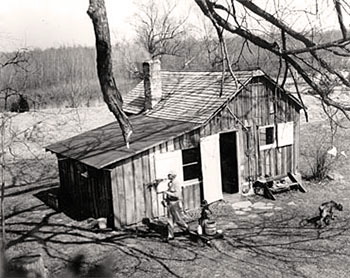
 |
| Photo from the Aldo Leopold Foundation Archives. |

The Leopold Family Shack & Farm
The Shack, a re-built chicken coop along the Wisconsin River where the Leopold family stayed during weekend retreats, continues to serve as the heart of the Foundation’s programs.
The land surrounding the Shack and farm provides a living classroom for exploring dynamic ecological relationships. Each year, thousands of visitors are inspired through tours, seminars, and workshops in the same landscape that deeply moved Leopold.
 A Revolutionary Experiment
A Revolutionary Experiment
In the winter of 1935, Aldo Leopold went down a two-track sand road in search of land for a family hunting camp. Alongside the Wisconsin River, he found a “worn out” farm available for eight dollars per acre.
Running counter to all cultural currents, he bought the bleak, windswept place rather than seeking out richer land some where else. The decision proved pivotal to Leopold’s family, his relationship to the land, and the millions of readers since inspired by
A Sand County Almanac.

Did Leopold realize the abandoned farm’s potential from the outset? No one knows for certain, but soon the family embraced the farm as a new kind of workshop or laboratory—a place to tinker and experiment with restoring health to an ailing piece of land. It was the sort of land common to a nation long obsessed with homesteading and suddenly stricken with the Great Depression and the Dust Bowl, twin specters of economic and natural catastrophe that shook the United States in the 1930s.
During weekends and breaks from school, Leopold, his wife Estella and their five children lived close to the land. Fixing up a dilapidated chicken coop, they created a home away from home which came to be known as “the Shack.” They tended a garden, cut firewood, and planted trees—eventually, some 40,000.
Doomed by Dust Bowl droughts, more than 95 percent of the pines died in the early years. Yet the family persevered, and spring planting at the farm became a rite of spring. Thousands of pines and other plantings eventually thrived, transforming the landscape into a mosaic of conifers, hardwoods, and prairie.
 |
| Photo from the Aldo Leopold Foundation Archives.
|
“I thought that
because fewer wolves meant more deer, that no wolves would mean hunters’
paradise. But after seeing the green fire die, I sensed that neither the wolf
nor the mountain agreed with such a view.”
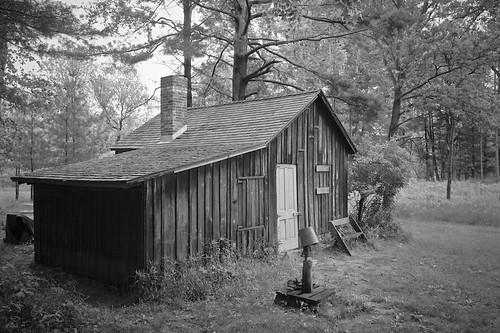 |
Aldo Leopold Shack in 2009
"We abuse land because we regard it as a commodity belonging to us. When we see land as a community to which we belong, we may begin to use it with love and respect."-- Aldo Leopold |
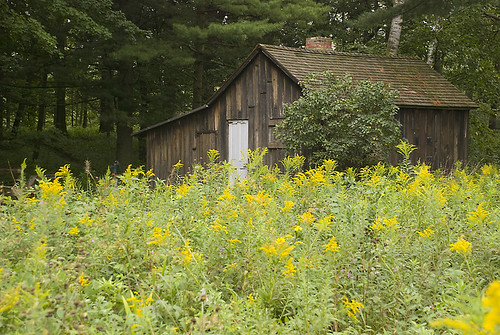 |
| Aldo Leopold ShackThe naturalist Aldo Leopold and his family stayed in this shack on his farm -Baraboo, WI |
A preview of the first full-length, high-definition documentary film ever made about legendary environmentalist Aldo Leopold, Green Fire highlights Leopold’s extraordinary career, tracing how he shaped and influenced the modern environmental movement. Leopold remains relevant today, inspiring projects all over the country that connect people and land. Learn more at GreenFireMovie.com
Photo from the Aldo Leopold Foundation Archives.
http://www.aldoleopold.org/
http://www.naturenet.com/alnc/aldo.html
http://www.hiltonpond.org/thisweek080301.html
http://alandethic.blogspot.com/2011_03_01_archive.html
http://gargravarr.cc.utexas.edu/chrisj/leopold-quotes.html#author
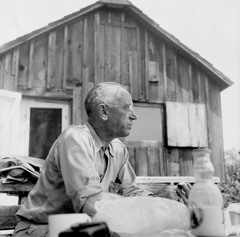
 The roots of Leopold's concept of a "land ethic" can be traced to his birthplace on the bluffs of the Mississippi River near Burlington, Iowa. As a youngster, he developed a zealous appreciation and interest in the natural world, spending countless hours on adventures in the woods, prairies, and river backwaters of a then relatively wild Iowa. This early attachment to the natural world, coupled with an uncommon skill for both observation and writing, lead him to pursue a degree in forestry at Yale.
The roots of Leopold's concept of a "land ethic" can be traced to his birthplace on the bluffs of the Mississippi River near Burlington, Iowa. As a youngster, he developed a zealous appreciation and interest in the natural world, spending countless hours on adventures in the woods, prairies, and river backwaters of a then relatively wild Iowa. This early attachment to the natural world, coupled with an uncommon skill for both observation and writing, lead him to pursue a degree in forestry at Yale.




 A Revolutionary Experiment
A Revolutionary Experiment
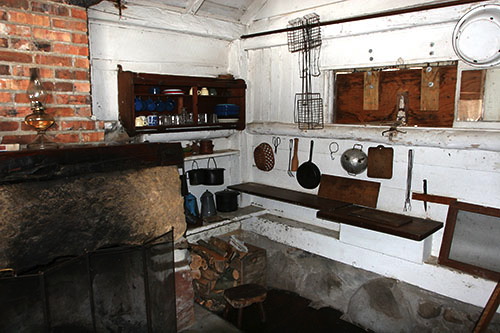







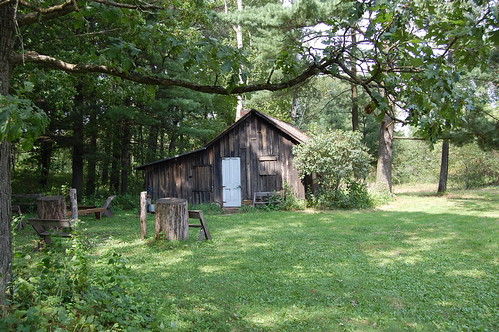
No hay comentarios:
Publicar un comentario